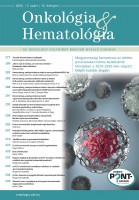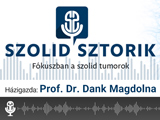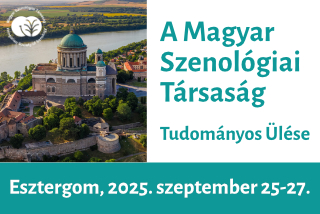Keresés eredménye
SABCS 2017 interview: Irene Wapnir
Management Controversies in Locoregional Recurrence - Symposium Summary...
SABCS 2017 interview: Jacqueline F. Bromberg
Exosome analysis in breast cancer: Clinical translation...
SABCS 2017 interview: Mothaffar Rimawi
Targeted therapy, HER2 positive news...
SABCS 2017 interview: Heikki Joensuu
Results of SOLD Study...
SABCS 2017 interview: Debu Tripathy
First-line ribociclib or placebo combined with goserelin and tamoxifen or a non-steroidal aromatase inhibitor in premenopausal women with hormone receptor-positive, HER2-negative advanced breast cancer: Results from the randomized Phase III MONALEESA-7 trial...
SABCS 2017 Press Wednesday: Matteo Lambertini
Pooled analysis of five randomized trials investigating temporary ovarian suppression with gonadotropin-releasing hormone analogs during chemotherapy as a strategy to preserve ovarian function and fertility in prmenopausal early breast cancer patients...
SABCS 2017 Press Wednesday: Dawn L. Hershman
Randomized Blinded Sham- and Waitlist-Controlled Trial of Acupuncture for Joint Symptoms Related to Aromatase Inhibitors in Women whith Early Stage Breast Cancer (SWOG 1200)...
SABCS 2017 Press Wednesday: Michael Gnant
A prospective randomized multi-center phase-III trial of additional 2 versus additional 5 years of Anastrozole after initial 5 years of adjuvant endocrine therapy - results from 3,484 postmenopausal women in the ABCSG-16 trial...
SABCS 2017 Press Wednesday: Heikki Joensuu
A randomized phase III study pf adjuvant trastuzumab for a duration of 9 weeks versus 1 year, combined with adjuvant taxane-anthracycline chemotherapy, for early HER2-positive breast cancer...
SABCS 2017 Press Thursday: Louis Fehrenbacher
NSABP B-47 (NRG Oncology) Phase III RCT Comparing Adjuvant Chemotherapy AC-Weekly Paclitaxel (WP) or TC x 6 with or without Trastuzumab for 1 Year in High-risk, Invasive Breast Cancer, Negative for HER2 by ISH and with IHC 1+ or 2+ (HER2-Low IBC)...
SABCS 2017 Press Thursday: Richard Gray
Increasing the dose intensity of adjuvant chemotherapy: an EBCTCG meta-analysis...
SABCS 2017 Press Thursday: Sherene Loi
Phase Ib/II Study Evaluating Safety and Efficacy of Pembrolizumab and Trastuzumab in Patients with Trastuzumab-Resistant HER2-positive Advanced Breast Cancer: Results from the PANACEA Study (IBCSG 45-13/BIG 4-13/KEYNOTE-014)...
Gratulálunk!
A március 15-i nemzeti ünnepen Széchényi-díjat vehetett át a Parlamentben Kásler Miklós professzor, aki rendkívül megtisztelőnek tartja ezt a kitüntetést. Munkássága legfontosabb állomásai között sorolta fel a fej-nyaki tumorok műtéteinek kiterjesztését, a sebészeti lézerek hazai bevezetésében játszott szerepét, a Nemzeti Rákkontroll Program létrehozását, és azt, hogy az általa vezetett intézmény Európa ...
Kettős HER2-gátlás emlőrákban
A kettős HER2-gátlás bevezetése igen nagy előrelépés volt az HER2-pozitív emlődaganatok kezelésében. Előrehaladott stádiumú betegek esetén lényegesen meghosszabbítja a túlélést, míg korai stádiumban a műtét előtt alkalmazva elősegíti a teljes gyógyulást. A 2017-es évtől a műtét utáni kezelés is lehetővé vált. Ismerjék meg a részleteket Boér Katalin tanárnővel a Magyar Onkológusok Társasága éves ...
Onkopszichológiai ellátás az Országos Onkológiai Intézetben
A daganatos betegségek – a szomatikus tüneteken túl – súlyos pszichés teherként nehezednek a rákos betegek vállára. A mai Onkológiai Intézetben a pszichológiai ellátás és a pszichiátriai gondozás is helyet talált magának. 2010-ben Kásler Miklós főigazgató úr kezdeményezésére a önálló szervezeti egységként Onkopszichológiai Munkacsoport alakult, aminek jelenleg nyolc pszichológus a tagja. Ennek történetét ...
A betegséghez kapcsolódó veszteségek és a gyász lélektana
A Kékgolyó Napok idei első rendezvényeként került megrendezésre februárban a Gyakorlati Onkopszichológia továbbképzés az Országos Onkológiai Intézetben. Gerlinger Lilla klinikai szakpszichológus előadásában a gyász lélektanát foglalja össze....
Specifikus lelki jelenségek a komplex onkológiai ellátás során – az áttétel és viszontáttétel
A Kékgolyó Napok idei első rendezvényeként került megrendezésre februárban a Gyakorlati Onkopszichológia továbbképzés az Országos Onkológiai Intézetben. A specifikus lelki jelenségeket Gödény Anna klinikai szakpszichológus dolgozta fel előadásában....
A sugárterápiához kapcsolódó lelki jelenségek és a pszichoedukáció jelentősége
A Kékgolyó Napok idei első rendezvényeként került megrendezésre februárban a Gyakorlati Onkopszichológia továbbképzés az Országos Onkológiai Intézetben. A sugárterápia- és a kórházi tartózkodás általános kihívásait, valamint a sugárterápiában részesülők pszichés problémáit Horváth Dóra klinikai szakpszichológus foglalta össze....
Sebészeti beavatkozásokkal kapcsolatos pszichológiai jelenségek és a műtétre való lelki felkészítés lehetőségei és gyakorlata
A Kékgolyó Napok idei első rendezvényeként került megrendezésre februárban a Gyakorlati Onkopszichológia továbbképzés az Országos Onkológiai Intézetben. Koncz Zsuzsa klinikai szakpszichológus a műtét előtt fokozódó szorongással és a sebész-beteg kapcsolattal kapcsolatos tapasztalatát osztotta meg az előadása során....
Általános onkopszichológia – a komplex ellátás kérdésköre
A Kékgolyó Napok idei első rendezvényeként került megrendezésre februárban a Gyakorlati Onkopszichológia továbbképzés az Országos Onkológiai Intézetben. A diagnózis közlésének pszichés vonatkozásiról Molnár Petra szakpszichológus jelölt tartott előadást....






